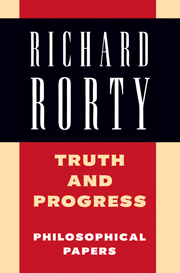Book contents
- Frontmatter
- Contents
- Introduction
- I Truth and Some Philosophers
- 1 Is Truth a Goal of Inquiry? Donald Davidson versus Crispin Wright
- 2 Hilary Putnam and the Relativist Menace
- 3 John Searle on Realism and Relativism
- 4 Charles Taylor on Truth
- 5 Daniel Dennett on Intrinsicality
- 6 Robert Brandom on Social Practices and Representations
- 7 The Very Idea of Human Answerability to the World: John McDowell's Version of Empiricism
- 8 Antiskeptical Weapons: Michael Williams versus Donald Davidson
- II Moral Progress: Toward More Inclusive Communities
- III The Role of Philosophy in Human Progress
- Index
7 - The Very Idea of Human Answerability to the World: John McDowell's Version of Empiricism
Published online by Cambridge University Press: 06 July 2010
- Frontmatter
- Contents
- Introduction
- I Truth and Some Philosophers
- 1 Is Truth a Goal of Inquiry? Donald Davidson versus Crispin Wright
- 2 Hilary Putnam and the Relativist Menace
- 3 John Searle on Realism and Relativism
- 4 Charles Taylor on Truth
- 5 Daniel Dennett on Intrinsicality
- 6 Robert Brandom on Social Practices and Representations
- 7 The Very Idea of Human Answerability to the World: John McDowell's Version of Empiricism
- 8 Antiskeptical Weapons: Michael Williams versus Donald Davidson
- II Moral Progress: Toward More Inclusive Communities
- III The Role of Philosophy in Human Progress
- Index
Summary
I shall begin by summarizing some of the most prominent features of John McDowell's Mind and World, a task made easier by his introduction to the paperback edition of that book, from which I shall borrow heavily.
McDowell's central notion is that of “answerability to the world.” He says that
to make sense of a mental state's or episode's being directed towards the world, in the way in which, say, a belief or judgment is, we need to put the state or episode in a normative context. A belief or judgment to the effect that things are thus and so … must be a posture or stance that is correctly or incorrectly adopted according to whether or not things are indeed thus and so. … This relation between mind and world is normative, then, in that thinking that aims atjudgment, or the fixation of belief, is answerable to the world – to how things are – for whether or not it is correctly executed.
Before going on, let me note that McDowell here does something that critics of the correspondence theory of truth have always complained about: he treats perceptual judgments as a model for all judgments. To say that “This is red” is “directed towards the world” or “answerable to the world” is intuitively plausible. But such phrases seem less applicable if one's paradigm of a belief is “We ought to love one another,” or “There are many transfinite cardinals,” or “Proust was only an effete petit bourgeois.”
- Type
- Chapter
- Information
- Truth and ProgressPhilosophical Papers, pp. 138 - 152Publisher: Cambridge University PressPrint publication year: 1998
- 11
- Cited by



